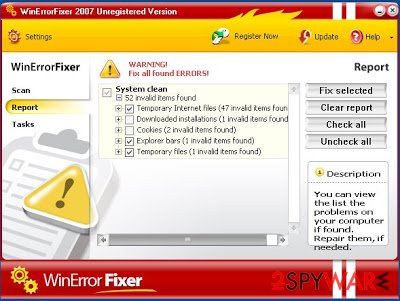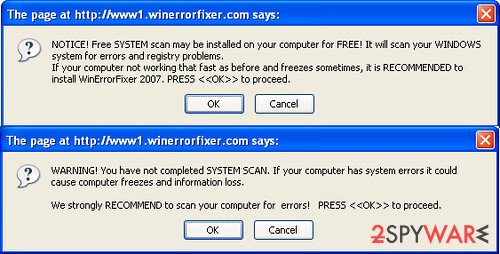WinErrorFixer (Removal Guide) - Free Guide
WinErrorFixer Removal Guide
What is WinErrorFixer?
WinErrorFixer is a fake antivirus software that initiates scam messages on your computer

WinErrorFixer is a corrupt anti-spyware application that shows fake scan results, gives fake reports about system status, and shows annoying warning messages to make users purchase rogue software. As evident, the main goal of the program is to mislead users and make them think that their PCs are in a bad state, regardless of their actual condition.
If you decide to purchase this app, you might disclose sensitive payment information to cybercriminals. This data can later be misused for fraud, money theft, or even identity fraud. So never purchase this program!
| Name | WinErrorFixer |
| Type | Rogue antispyware, malware |
| Distribution | Fake online scanners, Trojans already installed on the system, software bundles |
| Dangers | Monetary losses, identity theft, fraud campaigns, installation of other malware |
| Removal | Use the instructions below to uninstall the program manually; if that does not work, perform a full system scan with SpyHunter 5Combo Cleaner |
| System fix | If you find your system crashing or delivering errors, use FortectIntego to fix virus damage automatically |
Rogue anti-spyware programs were extremely popular around ten years ago when regulations and security measures were lacking from the operating system, as well as the search engines/browsers and other tools. This opened a gap for cybercriminals to offer users fake security tools which were malicious themselves.
While such programs can be encountered much more rarely, it does not mean that they are gone. In fact, you might still download WinErrorFixer on some shady website or encounter a scam message that promotes it. Do not download this program, as it is malware in disguise.
Several intrusive pop-ups can show up when Windows is operational. This is done deliberately in order to make it look like the system is infected with various computer parasites that need to be removed immediately. Here is one of the warning messages that is shown directly from the taskbar:
Warning! WinErrorFixer has detected 50 errors + ADULT content on your computer. The errors found on your computer are very likely to create subsequent problems if not fixed immediately… You need to register WinErrorFixer 2007 to remove and fix these errors. Click “Repair” to register your product and fix all the errors detected.
Please do not believe these claims, as the only virus is this program itself. In order to remove it from Windows, you should access Control Panel and try uninstalling it from there. If that does not work, perform a full system scan with SpyHunter 5Combo Cleaner or Malwarebytes. You should also clean your web browsers – you can do it with FortectIntego.

Distribution and evasion of rogue programs
There are several ways you could have infected your computer with this malicious program, for example:
- installed it along other programs downloaded from third-party site;
- was implemented by an already installed Trojan;
- did not notice an optional component in a software bundle.
Malicious programs might also be delivered automatically via software vulnerabilities or drive-by downloads. Therefore, equip your computer with robust anti-malware software and install the latest security updates for Windows and all the installed apps.
Delete WinErrorFixer malware from your PC
If you have already downloaded and installed this program on your system, it could be heavily compromised. As a first step, you should access the Programs and Features section and uninstall the app from there. If you do not succeed, do not worry.
Robust anti-malware software can find and eliminate all the malicious files for you. Besides, security applications can also check whether your system is infected with more serious viruses and eliminate them all at once.
You may remove virus damage with a help of FortectIntego. SpyHunter 5Combo Cleaner and Malwarebytes are recommended to detect potentially unwanted programs and viruses with all their files and registry entries that are related to them.
Getting rid of WinErrorFixer. Follow these steps
Uninstall from Windows
Instructions for Windows 10/8 machines:
- Enter Control Panel into Windows search box and hit Enter or click on the search result.
- Under Programs, select Uninstall a program.

- From the list, find the entry of the suspicious program.
- Right-click on the application and select Uninstall.
- If User Account Control shows up, click Yes.
- Wait till uninstallation process is complete and click OK.

If you are Windows 7/XP user, proceed with the following instructions:
- Click on Windows Start > Control Panel located on the right pane (if you are Windows XP user, click on Add/Remove Programs).
- In Control Panel, select Programs > Uninstall a program.

- Pick the unwanted application by clicking on it once.
- At the top, click Uninstall/Change.
- In the confirmation prompt, pick Yes.
- Click OK once the removal process is finished.
Remove from Microsoft Edge
Delete unwanted extensions from MS Edge:
- Select Menu (three horizontal dots at the top-right of the browser window) and pick Extensions.
- From the list, pick the extension and click on the Gear icon.
- Click on Uninstall at the bottom.

Clear cookies and other browser data:
- Click on the Menu (three horizontal dots at the top-right of the browser window) and select Privacy & security.
- Under Clear browsing data, pick Choose what to clear.
- Select everything (apart from passwords, although you might want to include Media licenses as well, if applicable) and click on Clear.

Restore new tab and homepage settings:
- Click the menu icon and choose Settings.
- Then find On startup section.
- Click Disable if you found any suspicious domain.
Reset MS Edge if the above steps did not work:
- Press on Ctrl + Shift + Esc to open Task Manager.
- Click on More details arrow at the bottom of the window.
- Select Details tab.
- Now scroll down and locate every entry with Microsoft Edge name in it. Right-click on each of them and select End Task to stop MS Edge from running.

If this solution failed to help you, you need to use an advanced Edge reset method. Note that you need to backup your data before proceeding.
- Find the following folder on your computer: C:\\Users\\%username%\\AppData\\Local\\Packages\\Microsoft.MicrosoftEdge_8wekyb3d8bbwe.
- Press Ctrl + A on your keyboard to select all folders.
- Right-click on them and pick Delete

- Now right-click on the Start button and pick Windows PowerShell (Admin).
- When the new window opens, copy and paste the following command, and then press Enter:
Get-AppXPackage -AllUsers -Name Microsoft.MicrosoftEdge | Foreach {Add-AppxPackage -DisableDevelopmentMode -Register “$($_.InstallLocation)\\AppXManifest.xml” -Verbose

Instructions for Chromium-based Edge
Delete extensions from MS Edge (Chromium):
- Open Edge and click select Settings > Extensions.
- Delete unwanted extensions by clicking Remove.

Clear cache and site data:
- Click on Menu and go to Settings.
- Select Privacy, search and services.
- Under Clear browsing data, pick Choose what to clear.
- Under Time range, pick All time.
- Select Clear now.

Reset Chromium-based MS Edge:
- Click on Menu and select Settings.
- On the left side, pick Reset settings.
- Select Restore settings to their default values.
- Confirm with Reset.

Remove from Mozilla Firefox (FF)
Remove dangerous extensions:
- Open Mozilla Firefox browser and click on the Menu (three horizontal lines at the top-right of the window).
- Select Add-ons.
- In here, select unwanted plugin and click Remove.

Reset the homepage:
- Click three horizontal lines at the top right corner to open the menu.
- Choose Options.
- Under Home options, enter your preferred site that will open every time you newly open the Mozilla Firefox.
Clear cookies and site data:
- Click Menu and pick Settings.
- Go to Privacy & Security section.
- Scroll down to locate Cookies and Site Data.
- Click on Clear Data…
- Select Cookies and Site Data, as well as Cached Web Content and press Clear.

Reset Mozilla Firefox
If clearing the browser as explained above did not help, reset Mozilla Firefox:
- Open Mozilla Firefox browser and click the Menu.
- Go to Help and then choose Troubleshooting Information.

- Under Give Firefox a tune up section, click on Refresh Firefox…
- Once the pop-up shows up, confirm the action by pressing on Refresh Firefox.

Remove from Google Chrome
Delete malicious extensions from Google Chrome:
- Open Google Chrome, click on the Menu (three vertical dots at the top-right corner) and select More tools > Extensions.
- In the newly opened window, you will see all the installed extensions. Uninstall all the suspicious plugins that might be related to the unwanted program by clicking Remove.

Clear cache and web data from Chrome:
- Click on Menu and pick Settings.
- Under Privacy and security, select Clear browsing data.
- Select Browsing history, Cookies and other site data, as well as Cached images and files.
- Click Clear data.

Change your homepage:
- Click menu and choose Settings.
- Look for a suspicious site in the On startup section.
- Click on Open a specific or set of pages and click on three dots to find the Remove option.
Reset Google Chrome:
If the previous methods did not help you, reset Google Chrome to eliminate all the unwanted components:
- Click on Menu and select Settings.
- In the Settings, scroll down and click Advanced.
- Scroll down and locate Reset and clean up section.
- Now click Restore settings to their original defaults.
- Confirm with Reset settings.

After uninstalling this potentially unwanted program (PUP) and fixing each of your web browsers, we recommend you to scan your PC system with a reputable anti-spyware. This will help you to get rid of WinErrorFixer registry traces and will also identify related parasites or possible malware infections on your computer. For that you can use our top-rated malware remover: FortectIntego, SpyHunter 5Combo Cleaner or Malwarebytes.
How to prevent from getting rogue antispyware
Access your website securely from any location
When you work on the domain, site, blog, or different project that requires constant management, content creation, or coding, you may need to connect to the server and content management service more often. The best solution for creating a tighter network could be a dedicated/fixed IP address.
If you make your IP address static and set to your device, you can connect to the CMS from any location and do not create any additional issues for the server or network manager that needs to monitor connections and activities. VPN software providers like Private Internet Access can help you with such settings and offer the option to control the online reputation and manage projects easily from any part of the world.
Recover files after data-affecting malware attacks
While much of the data can be accidentally deleted due to various reasons, malware is one of the main culprits that can cause loss of pictures, documents, videos, and other important files. More serious malware infections lead to significant data loss when your documents, system files, and images get encrypted. In particular, ransomware is is a type of malware that focuses on such functions, so your files become useless without an ability to access them.
Even though there is little to no possibility to recover after file-locking threats, some applications have features for data recovery in the system. In some cases, Data Recovery Pro can also help to recover at least some portion of your data after data-locking virus infection or general cyber infection.
